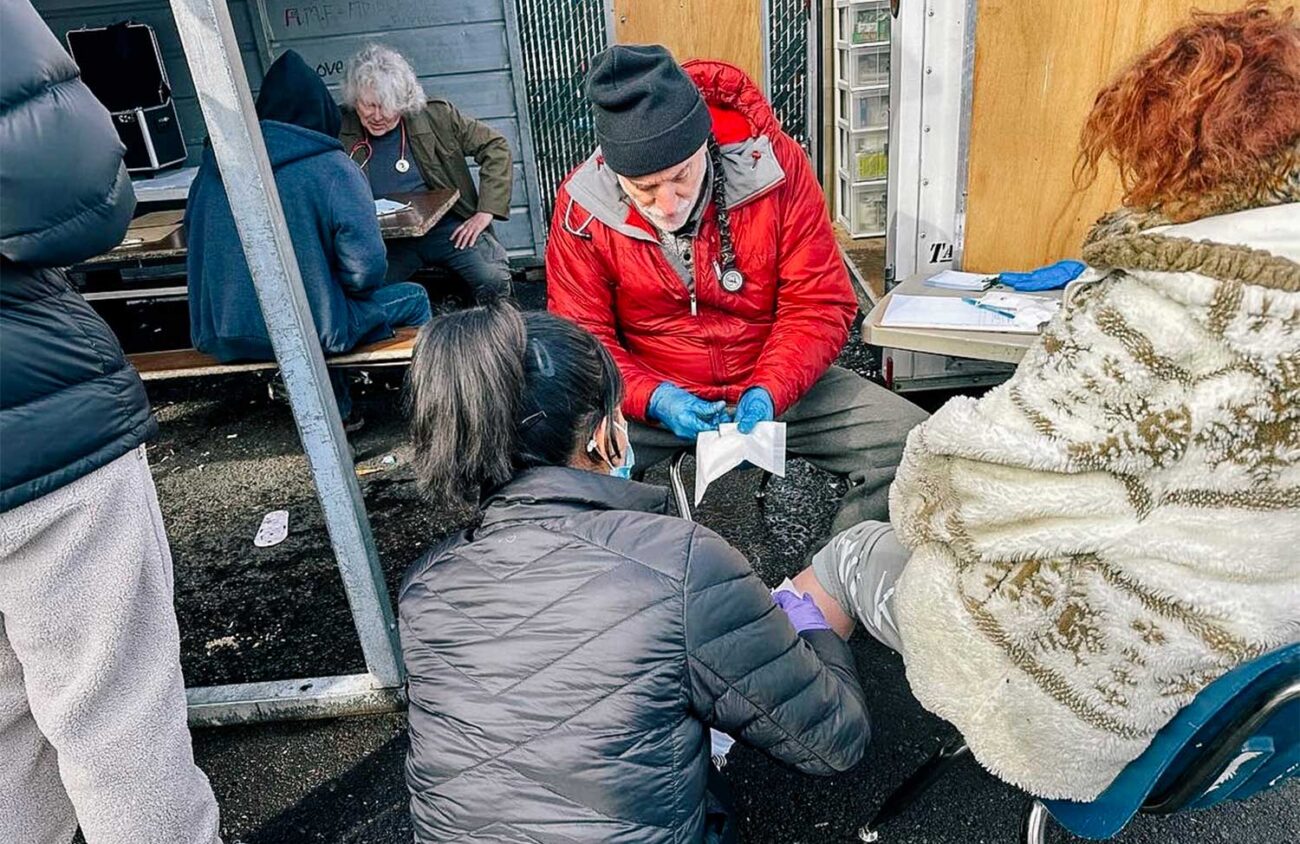Occupy Medical first began operating in 2011, when a loosely knit group of enthusiastic medical professionals and volunteers ran a weekly clinic under a first aid tent as an outgrowth of the Occupy movement. As the team grew, and Occupy Medical expanded, the group refitted a former blood mobile bus into an iconic on-the-wheels mobile clinic that was used until 2017.
Today, just over 12 years since the beginning, the nonprofit is still in town, serving Eugene as a model for universal health care. For the last six months, the Occupy team has offered free weekly clinics under tents every Saturday, alternating their locations between the St. Vincent De Paul Service Center and Washington Jefferson Park.
The Occupy Wall Street movement, which Occupy Medical grew from, was a protest against inequality in America, a country where the richest 1 percent dominates the economy, Occupiers said. The demonstrations ignited nationwide action to reshape the narrative around economic justice. In Eugene, Occupiers camped in Washington Jefferson Park and called attention to the plight of the unhoused.
Dr. William Foster is the medical director of Occupy Medical. He says holding bi-weekly pop-up clinics at locations like St. Vincent De Paul, where lots of people gather to access resources like free meals and showers, is crucial for medical outreach.
He says, “Having worked with the unhoused populations for close to 15 years now, I realize you have to go where they are. Asking to come to a clinic presents lots of barriers like transportation and bad weather. It has been important to find places we can be, where there are a lot of unhoused people congregating. Knowing that we will be here every other Saturday and trying to get that word out is key.”
Foster adds, “This population needs help in so many areas, aside from just being unhoused. A lot of them have not had great experiences with doctor’s offices and emergency rooms. They require ongoing care, not just acute care.”
Daniel Meyers is a regular patient at Occupy Medical’s bi-weekly St. Vincent De Paul clinic off Highway 99.
He says that a lack of trust in hospitals within the houseless community stems from unfair profiling. Meyers recalls his own experience. “I got taken into the hospital once, I couldn’t even walk on my feet and they discharged me, giving me a used pair of boots that somebody had clearly just left there. I got escorted out by security and couldn’t even use a phone to call someone for a ride. When a hospital kicks you out and refuses to treat you — that’s a problem.”
What started as a handful of medically trained volunteers willing to serve the community has evolved into Occupy Medical’s cohesive team of primary care practitioners who offer a wide variety of high-quality health care services.
The nonprofit maintains its slogan, “Health care is a human right,” assuring their patients of two things — no costs and no judgments.
After being unhoused for more than six years, and a recent stint in jail, Meyers is staying at the Dusk to Dawn emergency shelter managed by St. Vincent De Paul. Now 39, Meyers plans to turn things around and says resources like Occupy Medical are beneficial. “It’s helpful because they are able to come here, right where all the people can get the certain kinds of treatment that they need.”
Foster has been practicing medicine for the last 30 years. The doctor runs the show here in Eugene for Occupy Medical every Saturday while also maintaining a full-time post at the PeaceHealth emergency room in Florence.
Foster is joined at the weekly clinics by two to three other physicians and one or two nurses. The rest are all willing and often eager pre-med students.
Kody Oyama, Alexa Brennan and Hannah Medved are all premed seniors at the University of Oregon. They have all volunteered with Occupy Medical since last year. “All three of us started volunteering every Saturday and ended up joining the board,” Oyama says.
Medved says that this was the perfect opportunity for her and her peers to get involved with the community to give back. “We’re able to get really good hands-on experience because we can also see and learn from patient-physician interactions.”
Foster hopes to motivate pre-med students to continue to do this type of medical outreach in their careers. “Certainly this is an exposure to medicine that is not like your typical emergency room or doctor’s office,” he says. “This is a very different view of medicine, and it’s been great to have willing pre-med students come and work.”
Brennan says, “It’s a really unique experience. To be so involved with this vulnerable population is not something you normally get to see in the medical field. If you want to be a physician it’s important that you see all kinds of patients, not just people in the ER with a broken arm. That’s not real life. Wanting to get involved in the community is the foundation of being a good physician.”
Foster says the students are quick learners, and he hopes the clinic shows them an aspect of medicine that, when they are doctors and nurses in eight to 10 years from now, can have an impact on them. He says that when Occupy Medical first started, one of the mottos they had was “Two hours a month ain’t bad.”
